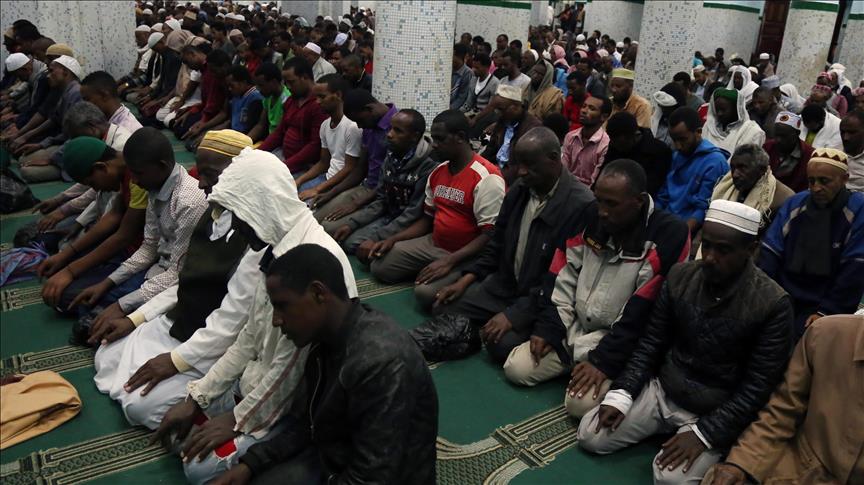 ADDIS ABABA, ETHIOPIA - JUNE 5, 2016: Muslims perform the first 'Tarawih' prayer on the eve of the Islamic holy month of Ramadan at the Anwar Grand Mosque in Addis Ababa. (Minasse Wondimu Hailu - Anadolu Agency)
ADDIS ABABA, ETHIOPIA - JUNE 5, 2016: Muslims perform the first 'Tarawih' prayer on the eve of the Islamic holy month of Ramadan at the Anwar Grand Mosque in Addis Ababa. (Minasse Wondimu Hailu - Anadolu Agency)
Addis Abeba
By Seleshi Tessema
ADDIS ABABA, Ethiopia
The sun had already sunk below the blood red horizon in Addis Ababa’s neighborhood of Semien Mazegaja as Jemal Ahmed and his wife Kebedech Aliyu prepared for the Muslim holy month of Ramadan.
Sitting in their neat one-bedroom home with their year-old twins Ismael and Issac sleeping nearby, Jemal, a Muslim, and his Orthodox Christian wife Kebedech explained how their different faiths did not prevent them from honoring each other’s religions.
“Thanks God, we lead a happy and cheerful marriage,” Jemal, 31, told Anadolu Agency. “We are faithful to our beliefs and a marriage that made us one."
Speaking in a soft voice, Jemal explained how he and Kebedech, 29, would fast and pray together during Ramadan. “I also accompany her in every religious event and Lent,” he added.
Their cross-religious marriage is reflected in their children’s names,” Jemal said. “Ismael and Issac are Christian and Muslim names so the kids will appeal to both religions and be what they would be.
“They are already Muslims, according to the teachings of Islam and our agreement.” Turning to his wife, he asked: “Is it not?”
“Hum,” she coughed and burst into merry laughter.
“This is a tradition in Ethiopia,” she said. “They have a religion that has accepted me wholeheartedly.”
In Ethiopia, which is home to one of the world’s oldest Christian communities, Sunni Muslims make up around 34 percent of the estimated population of 97 million.
According to Islamic scholar Ahmed Abdurrahman, Ramadan in Ethiopia has always been marked by interaction between Muslims and Christians.
“Here there is no segregation,” he said. “No Christian- or Muslim-only neighborhoods. We have lived as one single indispensably linked community ever since Islam arrived in Ethiopia.
“Since then our Christian fellowmen join us during iftar [the evening fast-breaking meal] and all-night prayers. We are also together with them in their Lent season and have a good time with them during holidays.”
Good will
Throughout Ramadan, Christian employers give Muslim women unconditional leave in an arrangement that has widespread support in the community.
“There are no written rules in this regard but a good will supported by every member of the organization,” Abdurrahman told Anadolu Agency.
“This is uniquely Ethiopian and during Ramadan we say our prayers on our knees to Allah to help us live in our tradition of love, respect and tolerance.”
As Ramadan arrived on Monday, the chaotic central market Merkato bustled with activity and music shops blared out Islamic songs.
“On the first day, we will be busy calling people whom we have pained and disappointed to apologize,” Jewad Hilal, 35, the owner of an electronic maintenance shop said. “We forget and forgive each other.”
Fitche Worku, a 70-year-old mother-of-five, said the first day of Ramadan would see elder members of the community help their juniors gain forgiveness.
“We do these negotiations for people who are near and far, at times over the telephone,” she said.
In the nearby fruit and vegetable market, the traders are stocked up for people buying for iftars. “So far the market seems pretty stable and affordable,” trader Abay Ayalew said.
However, prices could soon shoot up to in response to demand as customers flock to buy all manner of produce, but especially dates, traditionally used to break the daily fast.
For Jemal, who has a family in the U.S. and Europe, the month should bring an unexpected bonus in the form of foreign currency from his overseas relatives. “This is what they usually do,” he said.



